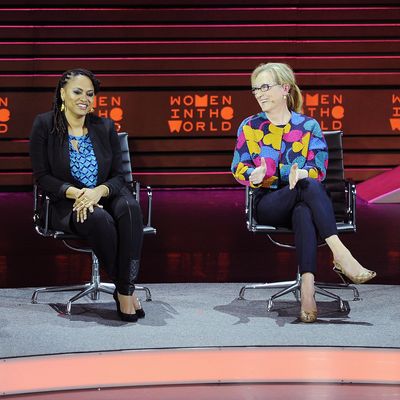
Wednesday night, three powerful female forces in Hollywood ÔÇö Meryl Streep, Ava DuVernay, and Sharmeen Obaid-Chinoy ÔÇö appeared on a panel in New York City at Tina BrownÔÇÖs annual Women in the World summit. But rather than having a chat about their shared experiences of being a woman in the film industry over a glass of wine┬á├á la Amy Schumer, the three enlightened self-proclaimed ÔÇ£assholeÔÇØ Jon Stewart on disrupting the patriarchy. (HeÔÇÖs out of The Daily Show August 6, so nowÔÇÖs probably their last chance.) Between clips from StreepÔÇÖs upcoming film Suffragette and Obaid-ChinoyÔÇÖs documentary about Pakistani working conditions, the four talked for nearly 40 minutes about art as activism, making men uncomfortable, and the radicalism of being a woman filmmaker.
They enjoy making men who watch their films uncomfortable.
Obaid-Chinoy, who won an Oscar for her 2012 documentary about acid attacks on women in Pakistan, enjoys making men uncomfortable if it leads to a call for action. Its only when youre uncomfortable and have to have difficult conversations that you will, perhaps, look at yourself in the mirror and not like the reflection, she explained to a bemused Stewart. (Point taken, he joked.) Her films, she says, are meant to make both male and female audiences face some of the dismal realities of life in Pakistan, even if it means immediate personal attacks on social media. I come from a country that sometimes thinks that Im a traitor  But its only when you make someone uncomfortable that theyre forced to tweet about you.
DuVernay wants to use technology as a lens to bear witness to injustice, but thatÔÇÖs not enough.
Despite #BlackLivesMatter and growing grassroots movements, not everyoneÔÇÖs watching. ÔÇ£Communities of marginalized people have always bore witness, but theyÔÇÖve not been valued by the dominant culture,ÔÇØ DuVernay says. ThatÔÇÖs starting to change with Twitter, but DuVernayÔÇÖs wary of what she calls ÔÇ£cell-phone blindnessÔÇØ to injustices like police brutality: ÔÇ£At what point do we [take action] or start to tune out because it hurts too much? ThereÔÇÖs precedent for there being a falloff when we start to become used to the image.ÔÇØ Streep added that thatÔÇÖs often how we use Twitter: ÔÇ£ItÔÇÖs like a flock of birds that [goes from one house to another], and then itÔÇÖs nowhere and we turn on Housewives.ÔÇØ
Meryl Streep thinks America learned how to empathize with ÔÇ£the otherÔÇØ by watching Roots.
ÔÇ£It was the first time that many, many white people had been introduced to ÔÇö or invited ÔÇö to feel what it would be like to be part of a black slave family,ÔÇØ she remembered of watching the miniseries in the ÔÇÿ70s. ÔÇ£When youÔÇÖre allowed to feel like the other person, like itÔÇÖs happening to you, itÔÇÖs a powerful, meaningful thing.ÔÇØ ThatÔÇÖs why, she says, more of those kinds of films are essential.
ItÔÇÖs important to consider who weÔÇÖre representing on film.
Streep also remembered having to identify with male protagonists in literature and film growing up. ÔÇ£I wanted to be Tom Sawyer, not Becky,ÔÇØ she joked. ÔÇ£[I want to] make men feel like they know what I feel,ÔÇØ Streep says of reversing that experience in her roles. That, Obaid-Chinoy says, is the reason why itÔÇÖs so important to her to make sure strong women are being seen and heard in her work: ÔÇ£We need to have heroes, we need to have strong, brave women, and we need to have their voices amplified. I need my daughters to have heroes in Pakistan, from my part of the world.ÔÇØ
Making women present in Hollywood is the ultimate symbol of activism in film.
Streep, DuVernay, and Obaid-Chinoy agreed that content isnÔÇÖt the whole of fighting for a cause in film. ÔÇ£When a woman makes a film, that is a radical act in itself,ÔÇØ DuVernay said to extended applause. ÔÇ£Our presence is a political statement,ÔÇØ she added of never wanting to think of a film like Selma as more activist-minded than a rom-com by another female director. Getting men to care about what women have to say, Streep pointed out, is the biggest challenge. ÔÇ£Studios know this is the hardest suit to wear,ÔÇØ she says. DuVernay, however, says itÔÇÖs up to women themselves to take action: ÔÇ£My white male counterparts donÔÇÖt have to start from zero [every time they make a film]. It has to be done without waiting for whoÔÇÖs letting us in or keeping us out.ÔÇØ


